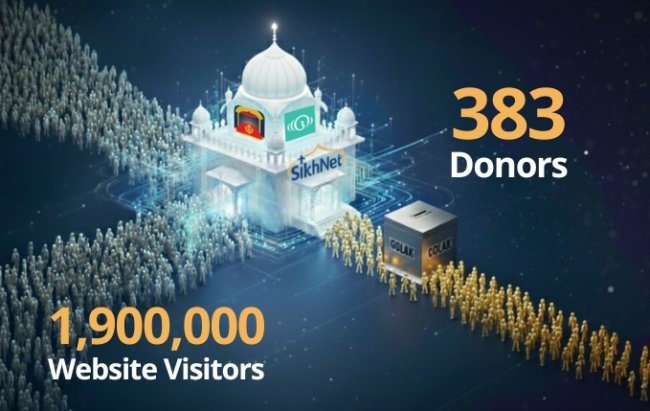Time flies -- Tempus fugit as they say – but Time that is the connecting link that dissects our existence neatly and inexorably into three: the past, present and future.
The past is history that tells us where we have been, a record of our efforts good and bad, victories and defeats, triumphs and retreats that one cannot relive. The future, yet unborn with plans, dreams, promises, direction, hopes that gave us life or died young. In between lies the restless expectant present. How uncertain is it?
Says Gurbani (ham aadhamee haa(n) ik dhamee muhalat muhat na jaanaa || p.660) that we are creatures of one breath alone; our previous breath is the past, the one yet to come is the uncertain future. Hence only one breath to live. So, live it fully, here and now.
The past is like the foundations to your house. If the foundations crumble the house collapses faster than you can imagine. So, take care of it and respect it. But don’t make your living quarters in it. Living in the past to rue it or celebrate it is so much nostalgia. It connects us to the process, pains and pleasures that brought us where we are today. Can it ever give us the exact remedy for the ills that beset us today in a constantly changing world?
As expected, in all animal species the survival instinct overrules all desires or temptations, and has been honed to its extreme complexity in the human.
Keep in mind also that the human is a tribal animal. Why? Because the human is too vulnerable at birth and soon thereafter to survive alone. Even the adult human is fragile and thrives best within the collective embrace of a community for security and progress. In such a reality, the shared language, cuisine, music, lifestyle and practices evolve into the defining principles and traditions –I call it a religious framework -- that provides security and trust. But this process also differentiates “us” from “them,” creating somewhat of a tribal existence of adversarial relationships, of friends and foes. This is how social scientists describe religions and similar institutions as the glue that creates communities.
See strains of this in the adage that “good fences make good neighbors.”
We need be extra careful that tribal reality does not morph into a schizoid existence of communities that distrust and undermine each other.
In any group or tribe, not all members are equally strong, talented, motivated or lucky, so not all are equally successful in garnishing the material rewards that life offers. Contradictory ambitions foster inequality and disharmony in the community. The other side of the coin is that competitive relationships can also encourage progress and inventiveness. How then to create a more just and balanced existence remains?
Religions try to discipline, redirect and reframe human behavior by the reward-penalty paradigm as a model of eternal justice after death. The systems are superbly complex and convoluted as are the religions that espouse them. The ideas of heaven and hell are attractive, even magical, but the primary problems surface in the world where we spend our lives, and that’s where the solutions need to be based. Sikhism is a major exception to such thinking and offers absolutely not a single geographical location or elaborate eye-popping design of a hell or heaven. A life lived righteously for the common greater good is recommended as the roadmap for a good life.
In the modern nations of this world, America is a novel, if not unique model for such thinking at least in theory, if not always in practice. This nation with a long vision from its very beginning of a people (truly a sample of human diversity) from much of the known world creating a common space --nation -- of shared values of universality and equality in opportunity and rights.
I am well aware that many nations propound ideas of a specific race, religion, language, cuisine, culture or ethnic identity as the only or preferred reality. American values assert that diversity is to be celebrated because it will enrich us all. Dignity and freedom are the rights of all people. Replacing totalitarianism with equal rights and freedom are good goals. To leap boldly into the future and give meaning to a good life is a laudable goal that seems to be too grand and mouth-watering. Somewhat like a sausage that is a pleasure to taste – a gourmet’s delight -- but keep on mind that watching one being made robs one of all pleasure.
Before someone points out the obvious let me suggest that these ambitious common goals are easier designed and articulated than achieved. The effort requires that we step out of our tribal existential cocoon to see people as they are with their common humanity, warts and all. And progress in even the most worthwhile causes is never linear. Two steps forward would often encounter a regressive path awhile with even a zig or two. As an example, with President Trump at the helm we may be in that zig-zag or even a backward slide. But history asks us to have courage for this, too shall pass.
Keep in mind that Abigail Adams (wife of the second President) wrote to her husband pointing out that women had no voice in this free land. And despite many attempts women got the right to vote only in 1920. Until the early 1970’s professional doors remained largely closed to them. Also remember the protracted struggle of Blacks for equality that still goes on despite the Civil War, the voting rights that came in 1965, and other positive steps, even a Black President (Barak Obama). Forget not the Asian exclusion act, and during World War II the internment of 120,000 Japanese-Americans, and not allowing a boat of Jewish refugees to land in America. And I’ll step aside today from the travails of the native Americans.
Yet America regained its bearings, perhaps as often as it lost them. And that gives me hope.
Societies develop rampant economic inequalities in unfairness and bias in opportunities for progress. Many corrective models have been tried but found wanting. Socialism and Communism are two of the classics. Their universal failure probably stems from the fact that a successful entrepreneur would more readily feather his own nest or that of his clan than help a needy stranger. This too seems inherent in the human DNA along with its twin of unselfish giving and service.
Better to keep in mind a little Gurbani (Naa ko baery naahi begaana…p. 1299, that I see no one as stranger or enemy) as the counterweight.
Look not for perfection but focus resolutely on the trajectory of our efforts with an eye on the pace, direction and measurable progress These, too, are human imperatives – the only ones that can set us free.
[email protected]
2020






